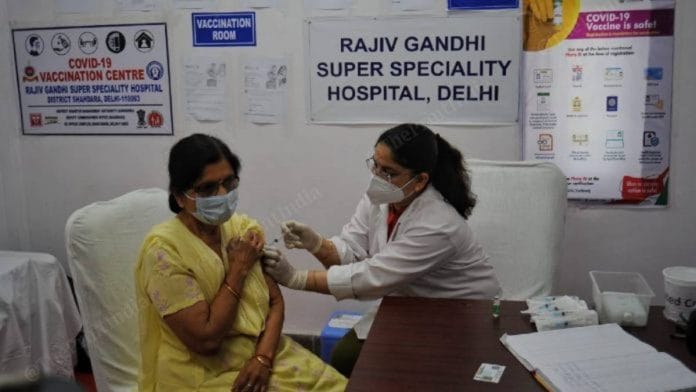New Delhi: A mere six per cent of all Covid vaccine doses administered in the country since 1 May were administered by the private sector, Union health secretary Rajesh Bhushan said Thursday. He was speaking at the Centre’s weekly Covid briefing.
Vaccinations opened for all adults from 1 May and the present practice of allocating a 25 per cent quota of all vaccines manufactured in the country for the private sector also started on the same date.
“Last week I had told you that I do not have the figures. Today I have the figures. So if we take the figures from 1 May to 22 September — this is a big qualification, so we are not talking of the entire period of vaccination, we are talking of May, June, July, August, and 22 days of September — roughly 6 per cent doses have been administered in private hospitals and remaining doses have been administered in public health facilities,” Bhushan said while replying to a question from ThePrint.
Since 1 May, a total of 67.86 crore vaccine doses have been administered in the country. Maharashtra has the highest percentage of vaccine doses administered in the private sector — about 18.9 per cent. No vaccines have been administered by the private sector in Ladakh, Lakshadweep and Arunachal Pradesh. In Uttar Pradesh, just a little over 1 per cent doses (13,00,423 doses) were administered by the private sector.
Bhushan had last week said that while a 25 per cent quota is budgeted for the private sector, it is not as if that amount of vaccines go unused if the private sector is not able to utilise all of it. “In that case, the government procures it,” he said.
Also read: Novavax vaccine shows 89.7% efficacy against Covid, UK clinical trial results show
Door-to-door vaccinations
The Centre has decided to allow door-to-door vaccinations for anybody with a physical challenge in reaching the vaccination booth. “We have written to all states on 22 September. This is to ensure equitable citizen-centric approach to vaccination. Any person willing to get vaccinated who cannot travel to the vaccination centre, we have made this arrangement,” Bhushan said Thursday.
In his letter to states dated 22 September, he wrote: “Customised citizen-friendly interventions like near-to-home Covid vaccination centres (NHCVCs) for elderly and differently-abled citizens was started in May 2021 and detailed SOP was issued in this regard to all states, UTS under this intervention alone. So far, 16.13 crore doses have been administered. While such CVCs (Covid vaccination centres) should continue to be functional, at the same time it must also be ensured that other CVCs are also fully accessible to persons with disabilities as per the accessibility standards mandated under the Rights of Persons with Disabilities Act 2016.” ThePrint has a copy of the letter.
He added in the letter: “It is understood that there are still some persons who might be bedridden or have extremely restricted mobility or disability and/or special needs that may hamper their accessibility even to NHCVCs. It is advised that a line list of such potential beneficiaries and caregivers may be prepared in the catchment area of every planning unit and collated at the district level. Subsequently, vaccination of such many beneficiaries maybe facilitated at their place of residence using mobile vaccination teams.”
Also read: Barring the two Covid waves, Indians think govt handled pandemic ‘very well’
47.8% vaccines given to females
Of all the vaccines administered so far, 47.8 per cent doses were to women and 52.2 per cent to men, according to data available with the health ministry. Additionally, 0.02 per cent vaccines were given to people who identified themselves as belonging to the “other” gender.
In September, India has managed to administer an average of 81.76 lakh doses every day — a sharp rise from the 59.19 lakh daily average of August. A quarter (25.42 per cent) of all vaccine doses were administered in urban areas and the rest in rural areas.
(Edited by Poulomi Banerjee)
Also read: 72% Indians confident Covid vaccines effective, 60% trust Indian shots, new survey finds






